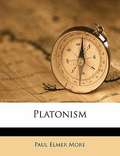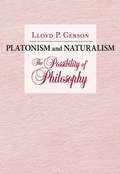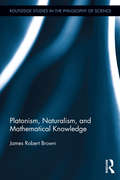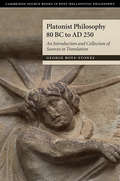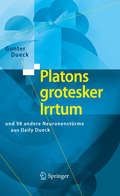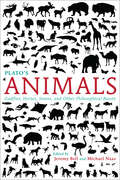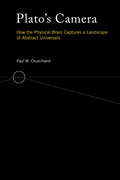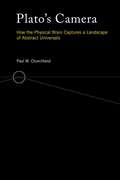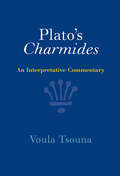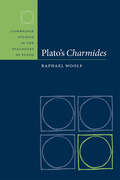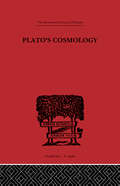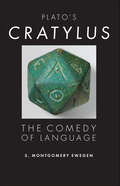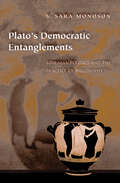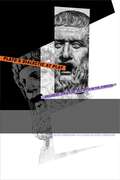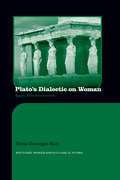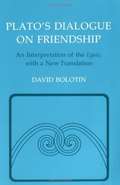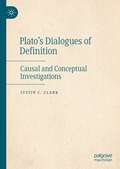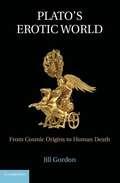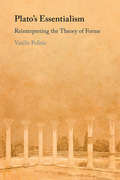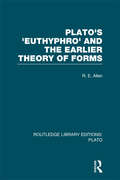- Table View
- List View
Platonism
by Paul Elmer MoreThough this book goes out under the rather presumptuous title of Platonism, no one can be more aware than the author of the incompleteness of its argument. Almost nothing, for instance, is said of education and art and government
Platonism and Naturalism: The Possibility of Philosophy
by Lloyd P. GersonIn his third and concluding volume, Lloyd P. Gerson presents an innovative account of Platonism, the central tradition in the history of philosophy, in conjunction with Naturalism, the "anti-Platonism" in antiquity and contemporary philosophy. Gerson contends that Platonism identifies philosophy with a distinct subject matter, namely, the intelligible world and seeks to show that the Naturalist rejection of Platonism entails the elimination of a distinct subject matter for philosophy. Thus, the possibility of philosophy depends on the truth of Platonism. From Aristotle to Plotinus to Proclus, Gerson clearly links the construction of the Platonic system well beyond simply Plato's dialogues, providing strong evidence of the vast impact of Platonism on philosophy throughout history. Platonism and Naturalism concludes that attempts to seek a rapprochement between Platonism and Naturalism are unstable and likely indefensible.
Platonism, Naturalism, and Mathematical Knowledge (Routledge Studies in the Philosophy of Science)
by James Robert BrownThis study addresses a central theme in current philosophy: Platonism vs Naturalism and provides accounts of both approaches to mathematics, crucially discussing Quine, Maddy, Kitcher, Lakoff, Colyvan, and many others. Beginning with accounts of both approaches, Brown defends Platonism by arguing that only a Platonistic approach can account for concept acquisition in a number of special cases in the sciences. He also argues for a particular view of applied mathematics, a view that supports Platonism against Naturalist alternatives. Not only does this engaging book present the Platonist-Naturalist debate over mathematics in a comprehensive fashion, but it also sheds considerable light on non-mathematical aspects of a dispute that is central to contemporary philosophy.
Platonist Philosophy, 80 BC to AD 250 (Cambridge Source Books in Post-Hellenistic Philosophy): An Introduction and Collection of Sources in Translation
by George Boys-Stones'Middle' Platonism has some claim to be the single most influential philosophical movement of the last two thousand years, as the common background to 'Neoplatonism' and the early development of Christian theology. This book breaks with the tradition of considering it primarily in terms of its sources, instead putting its contemporary philosophical engagements front and centre to reconstruct its philosophical motivations and activity across the full range of its interests. The volume explores the ideas at the heart of Platonist philosophy in this period and includes a comprehensive selection of primary sources, a significant number of which appear in English translation for the first time, along with dedicated guides to the questions that have been, and might be, asked about the movement. The result is a tool intended to help bring the study of Middle Platonism into mainstream discussions of ancient philosophy. Provides a comprehensive collection of source-texts in English translation, which makes many of them accessible for the first time to a wide range of students and scholars. Covers the full range of philosophical interests and debates of 'Middle' Platonism, making the case for its philosophical importance. Sections of notes and further reading help the reader navigate the complexities of previous scholarship.
Platons grotesker Irrtum
by Gunter DueckSeit 2005 schreibt der Bestsellerautor Gunter Dueck auf seiner Hompepage www.omnisophie.com alle 14 Tage ein neues "Daily Dueck". Mehr als 5000 Stammleser finden dort Satirisches, Ergötzliches oder auch herb Kritisches. Der Band versammelt die ersten 99 "Daily Duecks" für diejenigen, die lieber ein Buch in den Händen halten möchten. Dueck warnte schon früh vor der Finanzkrise, er schreibt witzige oder ätzend scharfe Pointen über Heuschrecken, treudoofe Bestandskunden, Arbeitsstress und Werteverluste und wirbt für mehr Vertrauen im Arbeitsleben.
Plato's Account of Falsehood
by Paolo CrivelliSome philosophers argue that false speech and false belief are impossible. In the Sophist, Plato addresses this 'falsehood paradox', which purports to prove that one can neither say nor believe falsehoods (because to say or believe a falsehood is to say or believe something that is not, and is therefore not there to be said or believed). In this book Paolo Crivelli closely examines the whole dialogue and shows how Plato's brilliant solution to the paradox is radically different from those put forward by modern philosophers. He surveys and critically discusses the vast range of literature which has developed around the Sophist over the past fifty years, and provides original solutions to several problems that are so far unsolved. His book will be important for all who are interested in the Sophist and in ancient ontology and philosophy of language more generally.
Plato's Animals: Gadflies, Horses, Swans, and Other Philosophical Beasts (Studies in Continental Thought)
by Jeremy Bell and Michael Naas“A unique and intriguing point of entry into the dialogues and a variety of concerns from metaphysics and epistemology to ethics, politics, and aesthetics.” —Eric Sanday, University of KentuckyPlato’s Animals examines the crucial role played by animal images, metaphors, allusions, and analogies in Plato’s dialogues. These fourteen lively essays demonstrate that the gadflies, snakes, stingrays, swans, dogs, horses, and other animals that populate Plato’s work are not just rhetorical embellishments. Animals are central to Plato’s understanding of the hierarchy between animals, humans, and gods and are crucial to his ideas about education, sexuality, politics, aesthetics, the afterlife, the nature of the soul, and philosophy itself. The volume includes a comprehensive annotated index to Plato’s bestiary in both Greek and English.“Plato’s Animals is a strong volume of beautifully written paeans to postmodern themes found in premodern thought.” —Notre Dame Philosophical Reviews“Shows readers of Plato that he remains significant to issues currently pursued in Continental thought and especially in relation to Derrida and Heidegger.” —Robert Metcalf, University of Colorado, Denver“Will provide fertile ground for future work in this area.” —Jill Gordon, author of Plato’s Erotic World
Plato’s Anti-hedonism and the Protagoras
by J. Clerk ShawPlato often rejects hedonism, but in the Protagoras, Plato's Socrates seems to endorse hedonism. In this book, J. Clerk Shaw removes this apparent tension by arguing that the Protagoras as a whole actually reflects Plato's anti-hedonism. He shows that Plato places hedonism at the core of a complex of popular mistakes about value and especially about virtue: that injustice can be prudent, that wisdom is weak, that courage is the capacity to persevere through fear, and that virtue cannot be taught. The masses reproduce this system of values through shame and fear of punishment. The Protagoras and other dialogues depict sophists and orators who have internalized popular morality through shame, but who are also ashamed to state their views openly. Shaw's reading not only reconciles the Protagoras with Plato's other dialogues, but harmonizes it with them and even illuminates Plato's wider anti-hedonism.
Plato's Camera: How the Physical Brain Captures a Landscape of Abstract Universals (The\mit Press Ser.)
by Paul M. ChurchlandA noted philosopher draws on the empirical results and conceptual resources of cognitive neuroscience to address questions about the nature of knowledge. In Plato's Camera, eminent philosopher Paul Churchland offers a novel account of how the brain constructs a representation—or "takes a picture"—of the universe's timeless categorical and dynamical structure. This construction process, which begins at birth, yields the enduring background conceptual framework with which we will interpret our sensory experience for the rest of our lives. But, as even Plato knew, to make singular perceptual judgments requires that we possess an antecedent framework of abstract categories to which any perceived particular can be relevantly assimilated. How that background framework is assembled in the first place is the motivating mystery, and the primary target, of Churchland's book. Unexpectedly, this neurobiologically grounded account of human cognition also provides a systematic story of how such low-level epistemological activities are integrated within an enveloping framework of linguistic structures and regulatory mechanisms at the social level. As Churchland illustrates, this integration of cognitive mechanisms at several levels has launched the human race on an epistemological adventure denied to all other terrestrial creatures.
Plato's Camera: How the Physical Brain Captures a Landscape of Abstract Universals
by Paul M. ChurchlandIn Plato's Camera, eminent philosopher Paul Churchland offers a novel account of how the brain constructs a representation--or 'takes a picture'--of the universe's timeless categorical and dynamical structure. This construction process, which begins at birth, yields the enduring background conceptual framework with which we will interpret our sensory experience for the rest of our lives. But, as even Plato knew, to make singular perceptual judgments requires that we possess an antecedent framework of abstract categories to which any perceived particular can be relevantly assimilated. How that background framework is assembled in the first place is the motivating mystery, and the primary target, of Churchland's book. His account draws on the best of the recent philosophical literature on semantic theory, and on the most recent results from cognitive neurobiology. The resulting story throws immediate light on issues that have been at the center of philosophy for at least two millennia, such as how the mind represents reality, both in its ephemeral and in its timeless dimensions. Unexpectedly, this neurobiologically grounded account of human cognition also provides a systematic story of how such low-level epistemological activities are integrated within an enveloping framework of linguistic structures and regulatory mechanisms at the social level. As Churchland illustrates, this integration of cognitive mechanisms at several levels has launched the human race on an epistemological adventure denied to all other terrestrial creatures.
Plato's Charmides: An Interpretative Commentary
by Voula TsounaThe Charmides is a difficult and enigmatic dialogue traditionally considered one of Plato's Socratic dialogues. This book provides a close text commentary on the dialogue which tracks particular motifs throughout. These notably include the characterization of Critias, Charmides, and Socrates; the historical context and subtext, literary features such as irony and foreshadowing; the philosophical context and especially how the dialogue looks back to more traditional Socratic dialogues and forward to dialogues traditionally placed in Plato's middle and late period; and most importantly the philosophical and logical details of the arguments and their dialectical function. A new translation of the dialogue is included in an appendix. This will be essential reading for all scholars and students of Plato and of ancient philosophy.
Plato’s Charmides
by Thomas M. TuozzoThis book argues that Plato's Charmides presents a unitary but incomplete argument intended to lead its readers to substantive philosophical insights. Through careful, contextually sensitive analysis of Plato's arguments concerning the virtue of sophrosyne, Thomas M. Tuozzo brings the dialogue's lines of inquiry together, carrying Plato's argument forward to a substantive conclusion. This innovative reading of Charmides reverses misconceptions about the dialogue that stemmed from an impoverished conception of Socratic elenchus and unquestioned acceptance of ancient historiography's demonization of Critias. It views Socratic argument as a tool intended to move its addressee to substantive philosophical insights. It also argues, on the basis of recent historical research, a review of the fragments of Critias' oeuvre and Plato's use of Critias in other dialogues, that Plato had a nuanced, generally positive view of Critias. Throughout, readers are alerted to textual difficulties whose proper resolution is crucial to understanding Plato's often abstract arguments.
Plato's Charmides (Cambridge Studies in the Dialogues of Plato)
by Raphael WoolfPlato's Charmides is a rich mix of drama and argument. Raphael Woolf offers a comprehensive interpretation of its disparate elements that pays close attention to its complex and layered structure, and to the methodology of reading Plato. He thus aims to present a compelling and unified interpretation of the dialogue as a whole. The book mounts a strong case for the formal separation of Plato the author from his character Socrates, and for the Charmides as a Platonic defence of the written text as a medium for philosophical reflection. It lays greater emphasis than other readings on the centrality of eros to an understanding of Socratic procedure in the Charmides, and on how the dialogue's erotic and medical motifs work together. The book's critical engagement with the dialogue allows a worked-out account to be given of how temperance, the central object of enquiry in the work, is to be conceived.
Plato's Cosmology: The Timaeus of Plato (International Library of Philosophy)
by Francis MacDonald CornfordThis is Volume IV of ten on a series of Ancient Philosophy. Originally published in 1937, this text offers Plato's 'Timaeus' translated with a running commentary discussing each problem of interpretation.
Plato's Cosmology and Its Ethical Dimensions
by Gabriela Roxana CaroneAlthough a great deal has been written on Plato's ethics, his cosmology has not received so much attention in recent times, and its importance for his ethical thought has remained underexplored. By offering accounts of Timaeus, Philebus, Politicus and Laws X, the book reveals a strongly symbiotic relation between the cosmic and human sphere. It is argued that in his late period Plato presents a picture of an organic universe, endowed with structure and intrinsic value, which both urges our respect and calls for our responsible intervention. Humans are thus seen as citizens of a university that can provide a context for their flourishing even in the absence of good political institutions. The book sheds new light on many intricate metaphysical issues in late Plato, and brings out the close connections between his cosmology and the development of his ethics.
Plato's Cratylus: The Comedy of Language (Studies in Continental Thought)
by S. Montgomery EwegenPlato's dialogue Cratylus focuses on being and human dependence on words, or the essential truths about the human condition. Arguing that comedy is an essential part of Plato's concept of language, S. Montgomery Ewegen asserts that understanding the comedic is key to an understanding of Plato's deeper philosophical intentions. Ewegen shows how Plato's view of language is bound to comedy through words and how, for Plato, philosophy has much in common with playfulness and the ridiculous. By tying words, language, and our often uneasy relationship with them to comedy, Ewegen frames a new reading of this notable Platonic dialogue.
Plato's Democratic Entanglements: Athenian Politics and the Practice of Philosophy
by S. Sara MonosonIn this book, Sara Monoson challenges the longstanding and widely held view that Plato is a virulent opponent of all things democratic. She does not, however, offer in its place the equally mistaken idea that he is somehow a partisan of democracy. Instead, she argues that we should attend more closely to Plato's suggestion that democracy is horrifying and exciting, and she seeks to explain why he found it morally and politically intriguing. Monoson focuses on Plato's engagement with democracy as he knew it: a cluster of cultural practices that reach into private and public life, as well as a set of governing institutions. She proposes that while Plato charts tensions between the claims of democratic legitimacy and philosophical truth, he also exhibits a striking attraction to four practices central to Athenian democratic politics: intense antityrantism, frank speaking, public funeral oratory, and theater-going. By juxtaposing detailed examination of these aspects of Athenian democracy with analysis of the figurative language, dramatic structure, and arguments of the dialogues, she shows that Plato systematically links democratic ideals and activities to philosophic labor. Monoson finds that Plato's political thought exposes intimate connections between Athenian democratic politics and the practice of philosophy. Situating Plato's political thought in the context of the Athenian democratic imaginary, Monoson develops a new, textured way of thinking of the relationship between Plato's thought and the politics of his city.
Plato's Dialectic at Play: Argument, Structure, and Myth in the Symposium
by Kevin Corrigan Elena Glazov-CorriganThe Symposium is one of Plato’s most accessible dialogues, an engrossing historical document as well as an entertaining literary masterpiece. By uncovering the structural design of the dialogue, Plato’s Dialectic at Play aims at revealing a Plato for whom the dialogical form was not merely ornamentation or philosophical methodology but the essence of philosophical exploration. His dialectic is not only argument; it is also play. Careful analysis of each layer of the text leads cumulatively to a picture of the dialogue’s underlying structure, related to both argument and myth, and shows that a dynamic link exists between Diotima’s higher mysteries and the organization of the dialogue as a whole. On this basis the authors argue that the Symposium, with its positive theory of art contained in the ascent to the Beautiful, may be viewed as a companion piece to the Republic, with its negative critique of the role of art in the context of the Good. Following Nietzsche’s suggestion and applying criteria developed by Mikhail Bakhtin, they further argue for seeing the Symposium as the first novel. The book concludes with a comprehensive reevaluation of the significance of the Symposium and its place in Plato’s thought generally, touching on major issues in Platonic scholarship: the nature of art, the body-soul connection, the problem of identity, the relationship between mythos and logos, Platonic love, and the question of authorial writing and the vanishing signature of the absent Plato himself.
Plato's Dialectic at Play: Argument, Structure, and Myth in the Symposium
by Kevin Corrigan Elena Glazov-CorriganThe Symposium is one of Plato’s most accessible dialogues, an engrossing historical document as well as an entertaining literary masterpiece. By uncovering the structural design of the dialogue, Plato’s Dialectic at Play aims at revealing a Plato for whom the dialogical form was not merely ornamentation or philosophical methodology but the essence of philosophical exploration. His dialectic is not only argument; it is also play. Careful analysis of each layer of the text leads cumulatively to a picture of the dialogue’s underlying structure, related to both argument and myth, and shows that a dynamic link exists between Diotima’s higher mysteries and the organization of the dialogue as a whole. On this basis the authors argue that the Symposium, with its positive theory of art contained in the ascent to the Beautiful, may be viewed as a companion piece to the Republic, with its negative critique of the role of art in the context of the Good. Following Nietzsche’s suggestion and applying criteria developed by Mikhail Bakhtin, they further argue for seeing the Symposium as the first novel. The book concludes with a comprehensive reevaluation of the significance of the Symposium and its place in Plato’s thought generally, touching on major issues in Platonic scholarship: the nature of art, the body-soul connection, the problem of identity, the relationship between mythos and logos, Platonic love, and the question of authorial writing and the vanishing signature of the absent Plato himself.
Plato's Dialectic on Woman: Equal, Therefore Inferior (Routledge Monographs in Classical Studies)
by Elena BlairWith the birth of the feminist movement classicists, philosophers, educational experts, and psychologists, all challenged by the question of whether or not Plato was a feminist, began to examine Plato’s dialogues in search of his conception of woman. The possibility arose of a new focus affecting the view of texts written more than two thousand years in the past. And yet, in spite of the recent surge of interest on woman in Plato, no comprehensive work identifying his position on the subject has yet appeared. This book considers not only the totality of Plato’s texts on woman and the feminine, but also their place within both his philosophy and the historical context in which it developed. But this book is not merely a textual study situating the subject of woman philosophically and historically; it also uncovers the implications hidden in the texts and the relationships that follow from them. It draws an image of the Platonic woman as rich and full as the textual and historical information allows, offering new and sometimes unexpected results beyond the topic of woman, illuminating aspects of Plato’s work that are of relevance to Platonic studies in general.
Plato's Dialogue on Friendship: An Interpretation of the Lysis, with a New Translation
by David BolotinPlato's Dialogue on Friendship contains: 1 The Title and the Interlocutors; 2 Socrates' Meeting with Hippothales; 3 Socrates' Conversation with Lysis; 4 The Question of Who Are Friends; 5 Those Who Love and Those Who Are Loved as Friends; 6 Likes and Opposites as Friends; 7 The Intermediate as a Friend of the Good; 8 The Kindred as Friends.
Plato’s Dialogues of Definition: Causal and Conceptual Investigations
by Justin C. ClarkIn each of Plato’s “dialogues of definition” (Euthyphro, Laches, Meno, Charmides, Lysis, Republic I, Hippias Major), Socrates motivates philosophical discussion by posing a question of the form “What is F-ness?” Yet these dialogues are notorious for coming up empty. Socrates’ interlocutors repeatedly fail to deliver satisfactory answers. Thus, the dialogues of definition are often considered negative— empty of any positive philosophical content. Justin C. Clark resists the negative reading, arguing that the dialogues of definition contain positive “Socratic” answers. In order to see the positive theory, however, one must recognize what Clark calls the "dual function" of the “What is F-ness?” question. Socrates is not looking for a single type of answer. Rather, Socrates is looking for two distinct types of answers. The “What is F-ness?” question serves as a springboard for two types of investigation— conceptual and causal. The key to understanding any of the dialogues of definition, therefore, is to decipher between them. Clark offers a way to do just that, at once resolving interpretive issues in Socratic philosophy, providing systematic interpretations of the negative endings, and generating important new readings of the Charmides and Lysis, whilst casting further doubt on the authenticity of the Hippias Major.
Plato's Erotic World
by Jill GordonPlato's entire fictive world is permeated with philosophical concern for eros, well beyond the so-called erotic dialogues. Several metaphysical, epistemological, and cosmological conversations - Timaeus, Cratylus, Parmenides, Theaetetus, and Phaedo - demonstrate that eros lies at the root of the human condition and that properly guided eros is the essence of a life well lived. This book presents a holistic vision of eros, beginning with the presence of eros at the origin of the cosmos and the human soul, surveying four types of human self-cultivation aimed at good guidance of eros, and concluding with human death as a return to our origins. The book challenges conventional wisdom regarding the "erotic dialogues" and demonstrates that Plato's world is erotic from beginning to end: the human soul is primordially erotic and the well cultivated erotic soul can best remember and return to its origins, its lifelong erotic desire.
Plato's Essentialism: Reinterpreting the Theory of Forms
by Vasilis PolitisIn this book, Vasilis Politis argues that Plato's Forms are essences, not merely things that have an essence. Politis shows that understanding Plato's theory of Forms as a theory of essence presents a serious challenge to contemporary philosophers who regard essentialism as little more than an optional item on the philosophical menu. This approach, he suggests, also constitutes a sharp critique of those who view Aristotelian essentialism as the only sensible position: Plato's essentialism, Politis demonstrates, is a well-argued, rigorous, and coherent theory, and a viable competitor to that of Aristotle. This book will appeal to students and scholars with an interest in the intersection between philosophy and the history of philosophy.
Plato's Euthyphro and the Earlier Theory of Forms: A Re-Interpretation of the Republic (Routledge Library Editions: Plato)
by R E AllenPlato’s Euthyphro is important because it gives an excellent example of Socratic dialogue in operation and of the connection of that dialectic with Plato’s earlier theory of Forms. Professor Allen’s edition of the dialogue provides a translation with interspersed commentary, aimed both at helping the reader who does not have Greek and also elucidating the discussion of the earlier Theory of Forms which follows. The author argues that there is a theory of Forms in the Euthyphro and in other early Platonic dialogues and that this theory is the foundation of Socratic dialogue. However, he maintains that the theory in the early dialogues is a realist theory of universals and this theory is not to be identified with the theory of Forms found in the Phaedo, Republic, and other middle dialogues, since it differs on the issues of ontological status.
